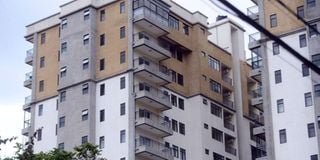
Pangani estate in Nairobi.
| File | Nation Media GroupNairobi
Premium
Revealed: Nairobi estates with the most affordable housing
Rongai is the most affordable place to reside in Nairobi metropolis, according to data published this week by data analytics startup ‘Bei ya Ukweli’.
The hood, located 25 kilometres from the city is attracting urban dwellers with constrained budgets, with a single bedroom costing Sh8,000 per month.

An apartment block in Kilimani, Nairobi.
“A single room costs Sh3,500, a bedsitter goes for Sh6,000, a two bedroom fetches Sh12,000 while a three-bedroom costs Sh15,000,” the study conducted between February 1 and February 20 this year, indicates.
Lavington and Kilimani, where real estate companies have built rentals from two-bedrooms, remain the most expensive areas to live within the city.
The cheapest amount you can pay for rent in the leafy suburb is Sh70,000, while a three-bedroom house will cost you Sh95,000 a month. Those with bigger families are used to parting with Sh150,000 a month for a four-bedroom house.
For upper middle class citizens, Westlands, Spring Valley and Kitisuru are the other posh zones where they can live, with rent dropping to Sh100,000 for a four-bedroom house and Sh70,000 for a three-bedroom house on average.
The survey has established that most lower middle class Kenyans working in the city reside in one-bedroom apartments and pay a rent of Sh10,000 in Ruiru and Kitengela, Sh11,000 in Umoja, Sh12,000 in Utawala and Zimmerman, Sh13,000 in Kawangware, Sh14,000 in Kahawa West, Sh15,000 in Kinoo, Sh16,000 in Kahawa West/Sukari and Sh17,000 in Fedha.
The same size of house goes for Sh22,000 in Ngumo, Sh25,000 in Ngong Road and South B, Sh28,000 in Pangani, Sh29,000 in Lang’ata and Sh35,000 in Ngara.
“On average, Nairobians pay Sh7,625 for a single room, Sh9,450 for a bedsitter, Sh17,553 for a one-bedroom, Sh33,323 for a two-bedroom, Sh50,714 for a three-bedroom and Sh80,000 for a four-bedroom.”
The cheapest place to live is Dandora and Kayole, where a single room costs Sh2,500 a month, but dwellers have to cope up with social insecurity.
Slum areas of Kibera, Mukuru, Korogocho and Mathare were not included in the study since they are classified as informal settlements.
Some of the many high-rise apartments found in Pipeline Estate, Embakasi South Constituency which houses thousands of citizens.
But what netizens are awaiting is the reduction of rent in several estates where they feel is expensive, as it has happened in previous weeks when ‘Bei ya Uweli’ shared the prices of various goods in different supermarkets, leading to a price harmonization across chain stores.
“I live in Kawangware and I pay Sh13,500 for my one-bedroom house. Am planning to move to Rongai if my landlord fails to reduce this amount,” Joseph Wesonga, a father of two said.
According to lead researcher at Bei ya Ukweli Anthony Wairegi, price of rent is determined by proximity to the CBD, luxury, security, level of traffic jam and presence of major amenities.
“We want to help Nairobians choose the best place to live. Houses that match the depth of their pockets, ultimately guarding them against hiked rent prices,” he told the Nation.





